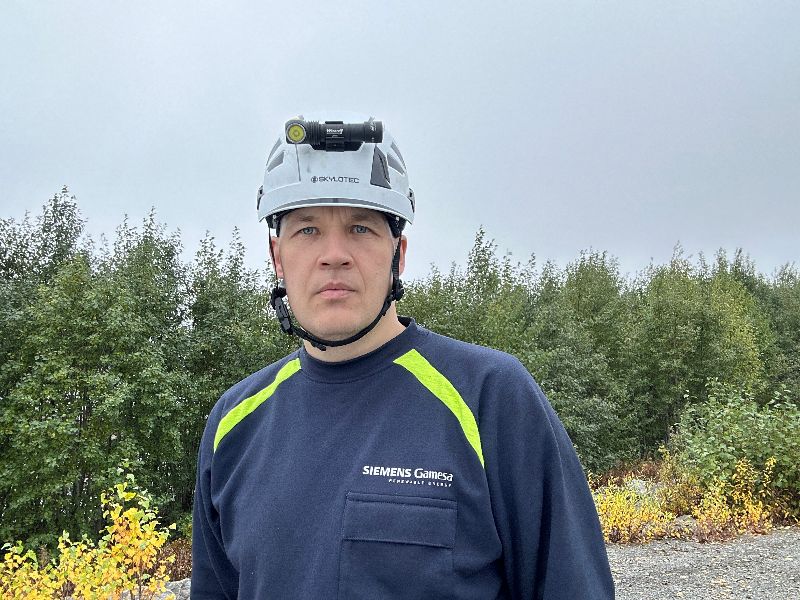Site lead, wind power
"The profession requires some general technical understanding, but you benefit especially when you have competence in electrical and automation technology. There are also two requirements for the maintenance of wind power turbines that are non-negotiable. The first is the courage to work at a height; you must be able to work at the height of 140 metres. The second is English skills; the wind power sector is an international field, and the working language is English."

- Sami Rytilahti
- Site lead at Siemens Gamesa Renewable Energy.
- Vocational Qualification in Electrical Engineering and Automation Technology at Oulu Technical School (Oulun teknillinen oppilaitos).
- 19 years of work experience in the field.
Briefly explain what you do for a living.
I work as Site Lead (maintenance manager) at Siemens Gamesa Renewable Energy. My tasks include co-ordinating and scheduling maintenance work and working as a supervisor for fitters. In addition, my job includes managing the maintenance budget and purchasing spare parts. The aim of my work is to keep the customer, i.e. the owners of wind farms, satisfied.
How have you ended up in the profession of your choice?
I graduated in 2005. It was summer and I was browsing the Kaleva newspaper. I read that WinWind is looking for electricians for building a wind power station. At that time, wind power was not a significant or well-known energy producer, but I submitted the application just as well. There were 500 applicants and only two got a job. I was one of them.
Describe your typical working day or week.
I start the morning by checking my emails. I make sure the wind turbines are running. After that, we have a morning meeting with the fitters, where we decide who will carry out the maintenance and who will carry out the repairs. During the week, the operation of the machines and electricity production must be monitored. I also prepare production plans for customer companies, i.e. estimates of how much electricity we are able to produce under the prevailing conditions.
On Fridays, we have a weekly meeting with the central office in Sweden. We draw up a preliminary work plan for the following week. In practice, however, this plan often gets rewritten, as when even one machine stops and is out of production, it changes the drafted schedule.
What kind of work environment or working hours do you have?
My work is mainly office work, but I sometimes like to go out to the wind turbines for hands-on work. I do more maintenance work especially when someone is on holiday or ill.
The aim is to do the work in the daytime, but there is often evening and weekend work. On weekends, there may be on-call services.
What kind of competence or qualities are required in the profession?
The profession requires some general technical understanding, but you benefit especially when you have competence in electrical and automation technology. There are also two requirements for the maintenance of wind power turbines that are non-negotiable. The first is the courage to work at a height; you must be able to work at the height of 140 metres. The second is English skills; the wind power sector is an international field, and the working language is English.
Cleverness and problem-solving skills are advantages because troubleshooting is sometimes a long process. You should have basic team and communication skills. You should also consider safety, i.e. you know what you are doing and understand the risks associated with different work stages. In addition, these tasks require flexibility because working days can become long.
What is the best thing about your profession?
The best thing about my profession is diversity, because no two days are the same. I have been in the field for many years and there are many advantages to long work experience. It has been nice to follow the development of wind power from the beginning of my career to this day. During my career, I have accumulated extensive networks from customers and subcontractors, which in practice means that I see familiar faces everywhere.
What are the downsides of the profession or what seems challenging?
Troubleshooting is not always easy. There are also situations where it is hard to find a fault. That is when you contact technical support.
What would you tell a person considering the profession of a site lead?
The wind power sector has interesting tasks and many different possibilities. The sector has a lot to offer, but it requires flexibility and a willingness to learn new things. There are job opportunities around the world because the working language is English. Networking always pays off, and you can build up work experience in Germany or Thailand if you want something different. If you are considering work tasks in the field, do not hesitate to contact potential employers, as there is a need for experts.
How do you see the future of your profession?
The future looks bright. There is plenty of work to do in different tasks. It is good to know that if investments in wind power in one country were frozen for some reason, there would be other work opportunities around the world.
